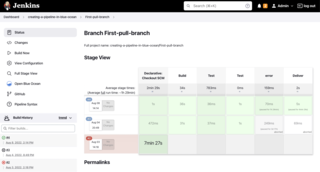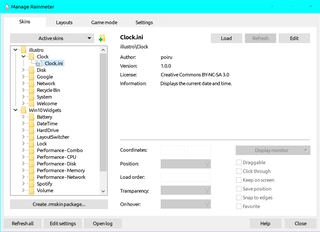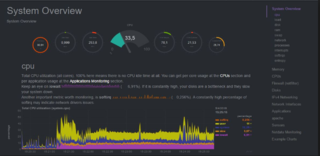
KDevelop is a free and open-source integrated development environment (IDE) for Unix-like computer operating systems and Windows. It provides editing, navigation and debugging features for several programming languages, and integration with build automation and version-control systems, using a plugin-based architecture.

RRDtool aims to handle time series data such as network bandwidth, temperatures or CPU load. The data is stored in a circular buffer based database, thus the system storage footprint remains constant over time.
Nagios is an event monitoring system. Nagios offers monitoring and alerting services for servers, switches, applications and services. It alerts users when things go wrong and alerts them a second time when the problem has been resolved.

The Multi Router Traffic Grapher (MRTG) is free software for monitoring and measuring the traffic load on network links. It allows the user to see traffic load on a network over time in graphical form.
File sharing is a method of distributing electronically stored information such as computer programs and digital media. Below is a list of file sharing applications, most of them make use of peer-to-peer file sharing technologies.

FindBugs is an open-source static code analyser created by Bill Pugh and David Hovemeyer which detects possible bugs in Java programs. Potential errors are classified in four ranks: (i) scariest, (ii) scary, (iii) troubling and (iv) of concern. This is a hint to the developer about their possible impact or severity. FindBugs operates on Java bytecode, rather than source code. The software is distributed as a stand-alone GUI application. There are also plug-ins available for Eclipse, NetBeans, IntelliJ IDEA, Gradle, Hudson, Maven, Bamboo and Jenkins.

Ghidra is a free and open source reverse engineering tool developed by the National Security Agency (NSA) of the United States. The binaries were released at RSA Conference in March 2019; the sources were published one month later on GitHub. Ghidra is seen by many security researchers as a competitor to IDA Pro. The software is written in Java using the Swing framework for the GUI. The decompiler component is written in C++, and is therefore usable in a stand-alone form.
FluidSynth, formerly named iiwusynth, is a free open source software synthesizer which converts MIDI note data into an audio signal using SoundFont technology without need for a SoundFont-compatible soundcard. FluidSynth can act as a virtual MIDI device, able to receive MIDI data from any program and transform it into audio on-the-fly. It can also read in SMF (.mid) files directly. On the output side, it can send audio data directly to an audio device for playback, or to a Raw or Wave file. It can also convert a SMF file directly to an audio file in faster-than-real-time. The combination of these features gives FluidSynth the following major use cases:
The following tables compare general and technical information for a number of notable network monitoring systems. Please see the individual products' articles for further information.

Geany is a free and open-source lightweight GUI text editor using Scintilla and GTK, including basic IDE features. It is designed to have short load times, with limited dependency on separate packages or external libraries on Linux. It has been ported to a wide range of operating systems, such as BSD, Linux, macOS, Solaris and Windows. The Windows port lacks an embedded terminal window; also missing from the Windows version are the external development tools present under Unix, unless installed separately by the user. Among the supported programming languages and markup languages are C, C++, C#, Java, JavaScript, PHP, HTML, LaTeX, CSS, Python, Perl, Ruby, Pascal, Haskell, Erlang, Vala and many others.

GitHub is a developer platform that allows developers to create, store, manage and share their code. It uses Git software, providing the distributed version control of Git plus access control, bug tracking, software feature requests, task management, continuous integration, and wikis for every project. Headquartered in California, it has been a subsidiary of Microsoft since 2018.

collectd is a Unix daemon that collects, transfers and stores performance data of computers and network equipment. The acquired data is meant to help system administrators maintain an overview over available resources to detect existing or looming bottlenecks.

Shinken is an open source computer system and network monitoring software application compatible with Nagios. It watches hosts and services, gathers performance data and alerts users when error conditions occur and again when the conditions clear.

Jenkins is an open source automation server. It helps automate the parts of software development related to building, testing, and deploying, facilitating continuous integration, and continuous delivery. It is a server-based system that runs in servlet containers such as Apache Tomcat. It supports version control tools, including AccuRev, CVS, Subversion, Git, Mercurial, Perforce, ClearCase, and RTC, and can execute Apache Ant, Apache Maven, and sbt based projects as well as arbitrary shell scripts and Windows batch commands.

Monitorix is a computer network monitoring tool that periodically collects system data and uses the web interface to show the information as graphs. Monitorix allows monitoring of overall system performance, and can help detect bottlenecks, failures, unusually long response times and other anomalies.

Cura is an open source slicing application for 3D printers. It was created by David Braam who was later employed by Ultimaker, a 3D printer manufacturing company, to maintain the software. Cura is available under LGPLv3 license. Cura was initially released under the open source Affero General Public License version 3, but on 28 September 2017 the license was changed to LGPLv3. This change allowed for more integration with third-party CAD applications. Development is hosted on GitHub. Ultimaker Cura is used by over one million users worldwide and handles 1.4 million print jobs per week. It is the preferred 3D printing software for Ultimaker 3D printers, but it can be used with other printers as well.

Octopussy, also known as 8Pussy, is a free and open-source computer-software which monitors systems, by constantly analyzing the syslog data they generate and transmit to such a central Octopussy server. Therefore, software like Octopussy plays an important role in maintaining an information security management system within ISO/IEC 27001-compliant environments.

Rainmeter is a free and open-source desktop customization utility for Windows released under the GNU GPL v2 license. It allows users to create and display user-generated customizable desktop widgets or applets called "skins" that display information. Ready to use collections of skins can be downloaded and installed in packages known as "suites".

PureScript is a strongly-typed, purely-functional programming language that transpiles to JavaScript, C++11, Erlang, and Go. It can be used to develop web applications, server side apps, and also desktop applications with use of Electron or via C++11 and Go compilers with suitable libraries. Its syntax is mostly comparable to that of Haskell. In addition, it introduces row polymorphism and extensible records. Also, contrary to Haskell, the PureScript language is defined as having a strict evaluation strategy, although there are non-conforming back ends which implement a lazy evaluation strategy.

With Netdata Users can monitor their servers, containers, and applications,in high-resolution and in real-time. Netdata is an open source tool designed to collect real-time metrics, such as CPU usage, disk activity, bandwidth usage, website visits, etc., and then display them in low-latency dashboards. The tool is designed to visualize activity in the greatest possible detail, allowing the user to obtain an overview of what is happening and what has just happened in their system or application.
















